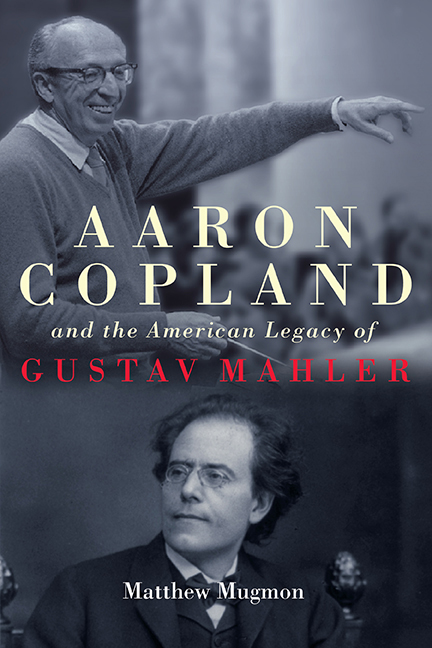Book contents
- Frontmatter
- Dedication
- Contents
- Acknowledgments
- Note on Musical Examples
- Introduction
- 1 Mahler and Copland in New York
- 2 Mahler in Nadia Boulanger's Studio and Beyond
- 3 Copland in Defense of Mahler
- 4 Mahler in Copland's Jewish Romanticism
- 5 Mahler's Idiom in Copland's “American” Sound
- 6 Copland, Koussevitzky, Mahler, and the Canon
- 7 Copland's Role in Bernstein's Mahler Advocacy
- Conclusion
- Notes
- Bibliography
- Index
- Eastman Studies in Music
4 - Mahler in Copland's Jewish Romanticism
Published online by Cambridge University Press: 18 September 2019
- Frontmatter
- Dedication
- Contents
- Acknowledgments
- Note on Musical Examples
- Introduction
- 1 Mahler and Copland in New York
- 2 Mahler in Nadia Boulanger's Studio and Beyond
- 3 Copland in Defense of Mahler
- 4 Mahler in Copland's Jewish Romanticism
- 5 Mahler's Idiom in Copland's “American” Sound
- 6 Copland, Koussevitzky, Mahler, and the Canon
- 7 Copland's Role in Bernstein's Mahler Advocacy
- Conclusion
- Notes
- Bibliography
- Index
- Eastman Studies in Music
Summary
This chapter takes as its starting point a remarkable comment Aaron Copland made late in his career about an apparent disconnect between his identities as both a Jewish and an American musician. In an interview from 1972, Ralph P. Locke asked Copland if he thought that “being Jewish has influenced your music.” Copland's striking reply suggested that he saw his Jewishness as a potential artistic liability and even a foil for a sense of American identity: “It's never been a problem,” he said. Although the “grandiosity in some of my larger works, like the Symphonic Ode … might be thought Jewish in origin,” Copland continued, “it hasn't been a preoccupation, certainly not to the extent that being American has.” Expanding on this implicit disconnect between Jewishness and Americanness, Copland invoked the idea of the “Jewish problem,” saying that it “never presented itself to me in any form or caused me any trouble, mostly because I wasn't brought up in a Jewish neighborhood, so I wasn't aware of Jewishness at the time, everyday [sic], from morning till night.” In the interview, Copland conceded that his own “so-called ‘American’ music” perhaps has “some Jewish characteristics,” but he could not identify them specifically. He noted the “relatively minor role” that Jewishness played in his music relative to Leonard Bernstein's, remarking that the younger figure had “a kind of patriotic fervor” about the subject. Copland's chamber work Vitebsk (1929) for violin, cello, and piano offers one of the only overt examples of a Jewish presence in his music, based as it is on a Hasidic song Copland heard at a production of S. Ansky's play The Dybbuk in 1925. Drawing a connection to his heritage as a child of Jewish immigrants from Eastern Europe (his parents came from what is today Lithuania), his goal for Vitebsk, he stated in his autobiography, was to “reflect the harshness and drama of Jewish life in White Russia.”
The fact that Copland answered a general question about Jewish influence in his work with a somewhat defensive reply about the “Jewish problem” (to which Locke did not refer in his question) helps situate his self-identification as a Jew and an American within the larger cultural environment of twentieth-century America—an environment in which, for a considerable period of time, Jews were seen with suspicion.
- Type
- Chapter
- Information
- Aaron Copland and the American Legacy of Gustav Mahler , pp. 67 - 81Publisher: Boydell & BrewerPrint publication year: 2019



